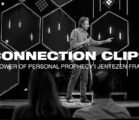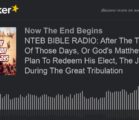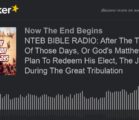Prophecy and Pragmatism by Rickie Dale Moore
From the very beginning of times, prophecy has been in important part of human existence. In the Old Testament age, the first Jew to be called a prophet of God was Abraham. He was also the father of the Israel nation. In the same way, in the New Testament Jesus was the first Church member to prophecy, and the starter of the church as well. This two fundamental Biblical examples show that every human based system God has started is parallel to beginning of a new prophetic age. This is so, because in every age God wants to speak to his people, letting them know His standards for life.
Prophecy and Pragmatism: “The fire and the Fence”
and Other Burdens for the church of God
by Rickie Dale Moore
On wrongly uniting the family of God
The division within the church has always been a problem discussed among its members, as well as irrelevant observers. Presenting the problem, however, with the Old Testament paradigms of the Babylon Tower and the Babylonian Captivity of the Israel nation is a rather good to describe it. The answer which brings the unity back to the Church is the covenant with the Lord. According to R. D. Moor it is built up on three specific points: memory, obedience, blessing; memory, to keep in mind the covenant, obedience, to abide in the promises and blessings as a result of the prior two.
Taking the subject of church unity even further, we see it present in the beginning chapters of the book of Acts. While God separated the tongues of the people at the tower of Babylon, He united them back again on the Day of Pentecost, when the Church received the Holy Spirit and the evidence of speaking in tongues. Among the elements in the Abrahamic covenant were memory, obedience and blessings. In the sermon of Peter, however, the elements of the New Covenant are promise, gift, and heritage:
- promise to the ones who had accepted the Holy Spirit
- gift to the ones who had kept the covenant
- heritage to the future generation of believers who would submit their lives and will to the covenant with God.
On Rightly dividing the word of God
The Scripture is the way God has preserved His words for us trough the centuries. It is rather a miracle that even the oldest copies of the original manuscripts found in the Dead Sea caves, are precisely unchanged, comparing to what we recognize today as the text of the Bible. Just like the ancient scribes copied the scrolls, we have numerous translations, interpretations and versions of the Scripture as our way of copying, publicizing and preserving the exact text of the Book.
On Getting it all together by pouring it all out
The story of Job used here is an example of endurance under the difficult situations in our lives. It seems like this is the exact time when our true integrity is both tested and made stronger. The text also deals with two important subjects particular for the Old Testament: blessing and curse. It is quite interesting to notice, that cursing the circumstances he was in as well as the day he was born, Job never curses his Creator. His integrity and belief in the faithfulness of God takes him even further – he blesses his Lord, taking the stand of true faith which humbly accepts everything that God has prepared in His divine plan.
On getting back together by letting it all go
After the example of Job, another good example of building up character and growing in power trough God is David. The “Tale about the Three Kings” by Edwards mentioned there, gives us the beginning of the New Testament narrative about the sacrifice of Jesus. Saul is the evil king who hates the David, a symbol of the common people. On the other side, Abesalom is a symbol of Christ, who takes the kingdom and gives it to David. This is a picture of Jesus who comes to world an takes the kingdom away from Satan. The He freely gives it to the Believers, whom it has belonged from the beginning.
On Words of Judgment to a broken home
The writer decries his personal burden he had felt – a feeling that passed trough his household and the people related to his family as well. This is situation is very close to the Biblical description of the burden that the judgment of God which the Sprit brings by His work of conviction to individual’s heart; however, the plan of God is not only to blame us, but to gather us like this small, back-yard-meeting with friends, that are ready to help us and pray with us. The results are always tremendous. God brings rest to the ones who felt the burden, as well as He brings heavenly blessing which are a gain to the whole community. It is a simple picture of how the obedience to God brings blessings; it also shows how even in His judgment God has a way out for us.
On Words of promise trough a broken stick
An extraordinary ending of the reading, which brings us to a fundamental, historical moment in the Church of God history – the split in the denomination. It also reminds us of the Old Testament story about the iron of the ax. In New Testament terms, this is a picture of the Church who has lost it’s power and cutting edge in the waters of this world. The only way to get it the power back is trough putting a peace of tree in the water. The story simply means that the “sharpness” of the Church can be only brought back trough the cross and the sacrifice of Jesus Christ.
OUR HOUSE IS TOO SMALL: The Burden of
the Spirit for Prophecy and Prophetic Nature
with in the Church of God School of Theology
by Gregory E. Moder, Jr.
On The birth of a prophecy: an exhortation and testimony
The beginning is an interested introduction to an exciting story put in the context of the nowadays life style. It is an expectation for miraculous move between the young generation. The text refers to the famous passage from the book of Acts 2, and especially the part where the prophecy talks about the children being supernaturaly used by the Spirit.
On Church, family and seminary as school of the prophets [part 1 and part 2]
Throughout the history of mankind, there has been a significant number of prophetic events – some false, some true. The Bible, however, keeps a record of prophecies dated to be thousands of years old, still relative to our time. We see the prophets being active when Israel was with God, as well as during the times when the chosen nation was failing to live according to the standards of Jehovah. But most of all we see God using the prophets in the times when it seemed like He had forgotten Israel, and had decided not to listen to their cry. His mercy was still “new every morning”, being brought by the words of the prophets. And even when the kings were wrong to lead the nation in sin, it seems like God was following a special pattern: He didn’t put down the kings, He raised up prophets. Trough them He brought His message to the nation of Israel, restoring faith, families and lives.
It also seems like this has not changed in the New Testament times. God still does not destroy presidents or rulers. Instead of that, He rises prophets, from the midst of the Church congregations. Once again in history, God will show that He is not interested in taking down rulers, but in rising prophets who will stand for His holy standards, speaking the words that He will give them to speak. This words of prophecy will lift up the standard of God on high; they will bring new peace and faith to the society, saving families and lives – if only the prophets of the 20th century are willing to speak outloud: “Thus seeth the Lord …”
On Do you really want us to prophesy?
Signed by the Generation X, our generation, the words of the “napkin prophesy” so strongly describe the painful picture of poor parenthood. It seems like before requiring a Godly standard of living and sensitivity to the Spirit from the young people, we must look for such in the adults – the leaders of the denomination, the leaders of the church, the leaders of the family. In this case, “Do you really want us to prophecy” is not only a question, but a hope for help, a cry for caring, and a longing for love. It is the call of one whole generation to its fathers simply saying, “Please, show us the way!”
On The call of Samuel, the fall of Eli and the school of Theology
As a natural continuation from the previous chapter, this is a confession of one generation to another. The call of Samuel, without a doubt the greatest prophet of the Israel Royal Age, represents the call of the new generation. How interesting, that the old generation of prophets is not dead, but even alive they have fail in:
- living the life of called by God prophets according to His holy standards
- seeing and having a prophetic vision, because of the weakness of their spiritual eyes
- being parents, who lead their children into the paths of righteousness and holy living, with the authority given them by God
- and most important of all, receiving word from God and obeying Him.
On the Diploma Prophecy & The book of Ecclesiastics in the light of the end
The story continues further into two not so famous, but important passages in the book of Ecclesiastics which are related to the particular situation.
The first one deals with the Diploma prophecy (chapter 6). It simply shows that numerous degrees and study achievements are not helpful when they become more important than the sensitivity and obedience to the Spirit of God. It also shows that God is jealous when His children are willing to pay more attention to certificates and degrees than to His words. He looks for a way to take our eyes from the documents and put it back on Him. Without this, God cannot use us.
The second one deals with a very unusual, but at the same time so well presented eschatological interpretation of a certain part of the book of Ecclesiastics. It is furthermore, the plan of God to make known His grace to the world by his servants the Qoheleth[1] till the time when, “… man goeth to his long home, and the mourners go about the streets: Or ever the silver cord be loosed, or the golden bowl be broken, or the pitcher be broken at the fountain, or the wheel broken at the cistern.
Then shall the dust return to the earth as it was: and the spirit shall return unto God who gave it. …. For God shall bring every work into judgment, with every secret thing, whether it be good, or whether it be evil.”
Ecclesiastics 12:4-6, 12
On The two ways to prophecy and The mustard seed prayer meeting [part 1 & part 2]
The theoretical orientation of the narrative finds its systematic and practical use, especially in part 2, in a specific prophetic ministry let by the Sprit. It not only brings light that helped others to call, but sets ground for future development of its spiritual and practical implications.
It is fascinating how even at the end of the 20th century, in the midst of the modern life, surrounded with the products of new technical discoveries and the results of modern humanism, the prophetic ministry is still an essential necessity. Its efficacy cannot be replaced by imitations.
On In order for our daughters to prophecy and The message of Brenda Taylor’s life
The final two chapters deal with the same problem from two different perspectives. They treat the luck of proportion among the male and female ministers in the Church of God. This is rather a good, very relevant to our days topic, having in mind that this denomination has been started with two man and six women as members of its first congregation. It has continued to have almost the same proportions during the century of its existence. Historically, it seems like the Church of God women has have faithfully paid the price to be ordained as ministers in our denomination. The ordination of women in the Church of God should not be looked at like something that the male members have allowed, but rather as God-given right.
The message of Brenda Taylor’s life is just another testimony of the countless mothers, wives and sisters who have given to fast, prayer and obedience to the Lord and to their man. For only the ones who have hunger and thirst for the will of the Lord, and longing for coming His kingdom, are the people who God calls His children, a holy nation, a chosen generation.
In Conclusion
At the end of this millennium, it look like it has become a rule to observe signs, miracles, messages and other supernatural phenomenas being a part of the portrait of world famous evangelists, TV and radio Christian networks, modernistic teachers and denominations other than the Church of God. It is rather surprising to read about the Spirit of God moving in a similar way among the Church of God people. It is a word of a great testimony, to see that God uses our denomination not only to bring His standards of holy life to the world, but among the midst of its congregation as well. It is extremely encouraging to learn that there are still people who are ready to listen to God when He wants to speak to them and send them as His messengers.
[1] Heb. to prophecy, to proclaim, to preach


